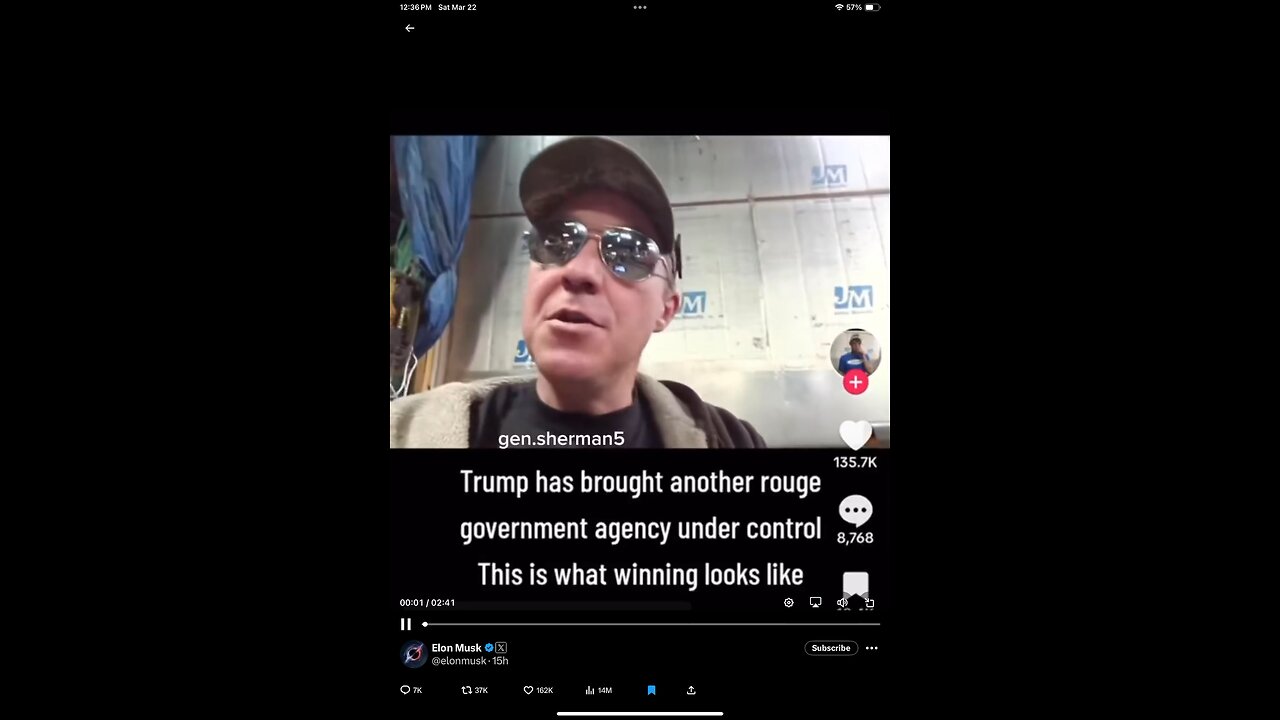Premium Only Content

DOGE Exposes Another NGO Money Laundering Machine. Details in the description below 🔽
The United States Institute of Peace (USIP) is an independent, nonpartisan institution established by Congress in 1984 through the United States Institute of Peace Act. Its mission is to prevent, mitigate, and resolve violent conflicts around the world while promoting peacebuilding, stability, and U.S. national security interests. USIP conducts research, provides training and education, operates programs in conflict zones, and collaborates with government agencies, NGOs, and international organizations to advance nonviolent conflict resolution. Based in Washington, D.C., it operates globally, with a focus on areas where U.S. strategic interests are at stake.
Annual Budget
USIP’s annual budget is funded primarily through congressional appropriations. For Fiscal Year (FY) 2025, USIP requested $55,459,000, though the exact appropriated amount can vary based on congressional decisions. Historically, its budget has fluctuated: it was $55 million in FY 2023, $56 million in FY 2024, and $39.5 million in FY 2011 after a 20% cut from the previous year. While its core budget is relatively small compared to other federal entities, USIP also receives occasional funds from government agencies like the State Department, USAID, and the Department of Defense. By law, it cannot accept private donations for its programmatic work, though this restriction was lifted for the construction of its headquarters, completed in 2011.
Targeting by the Department of Government Efficiency (DOGE)
The Department of Government Efficiency (DOGE), an entity associated with the Trump administration’s efforts to reduce federal spending and workforce size in 2025, targeted USIP as part of a broader initiative to eliminate or scale back agencies perceived as non-essential or inefficient.
• When: The targeting began with an executive order signed by President Donald Trump on February 19, 2025, which identified USIP among several governmental entities for elimination or reduction “to the maximum extent consistent with applicable law.” Actions escalated in March 2025, with significant events unfolding around March 14–18, 2025.
• Where: The primary confrontation occurred at USIP’s headquarters in Washington, D.C., located at 23rd Street and Constitution Avenue NW, across from the State Department. This site became the focal point of DOGE’s physical attempts to assert control.
• Why: DOGE, led by figures like Elon Musk, aimed to cut federal spending and dismantle agencies involved in foreign assistance, viewing them as wasteful or misaligned with the administration’s priorities. USIP, despite its modest core budget, was seen as a target due to its role in securing additional government and donor funds for peacebuilding projects worldwide—potentially billions since its inception through over 2,300 grants awarded since 1986. Critics, including DOGE supporters, argued it lacked accountability and operated with insufficient oversight, while the Trump administration sought to redirect resources toward military and domestic priorities. USIP’s work in conflict zones and its partnerships with agencies like the State Department and Department of Defense made it part of the “foreign assistance family” that the administration aimed to downsize.
• How: The process unfolded as follows:
◦ February 19, 2025: Trump’s executive order directed USIP and similar entities to reduce their functions and personnel to the legal minimum and report compliance to the Office of Management and Budget. This set the stage for DOGE’s intervention.
◦ March 14, 2025: The administration fired most of USIP’s bipartisan board of directors, leaving only three ex-officio members (the Secretaries of State and Defense, and the National Defense University President), who then dismissed USIP President and CEO George Moose and appointed Kenneth Jackson as acting president.
◦ March 17–18, 2025: DOGE staff attempted to enter USIP’s headquarters. On Friday, March 14, they were turned away after arriving with FBI agents, as USIP’s lawyers cited its independent, nonprofit status. On Monday, March 17, DOGE returned with police support, entered the building, and evicted USIP officials, including Moose, who called it an “illegal takeover.” Metropolitan Police were involved, and the private security team’s contract was canceled, allowing DOGE to take control.
◦ Legal Resistance: USIP leadership and five fired board members filed a lawsuit on March 18, 2025, in D.C., alleging unlawful trespass and board dismissals, arguing that the institute’s independent status (as a congressionally chartered nonprofit, not an executive branch agency) protected it from such actions. A federal judge denied their request to block DOGE on March 19, though she criticized the takeover’s execution.
The conflict highlighted a legal gray area: while the President can appoint and remove USIP board members with board or congressional approval under its founding statute, USIP argued its private status shielded it from executive overreach. DOGE and the administration countered that USIP’s federal funding and noncompliance with the executive order justified their actions, framing it as a necessary step to ensure accountability to taxpayers. The outcome remains contested as of March 22, 2025, with ongoing legal and political ramifications.
-
 LIVE
LIVE
vivafrei
52 minutes agoKamala Harris Security Being "Pulled"? Kilmar Wants Trump Admin GAGGED! Fake News GALORE & MORE!
1,353 watching -
 1:33:32
1:33:32
The Quartering
2 hours agoContest Winners Picked, More Trans Attacks, SNL Collapsing, Raja Jackson STILL Not Arrested!
111K99 -
 1:19:44
1:19:44
Mark Kaye
3 hours ago🔴 Kamala FURIOUS Over Trump's Latest Move!
2.84K -
 21:14
21:14
Jasmin Laine
48 minutes ago“Absolute Nonsense Policy”—CBC Guest DROPS Savage TRUTH! Poilievre LEAVES Reporters SPEECHLESS
5 -
 2:01:48
2:01:48
The Charlie Kirk Show
3 hours agoZero Percent Approval Democrats + Two Million Deportations | Bergquam, Sec. Noem, Bowyer | 8.29.2025
39.5K17 -
 1:52:52
1:52:52
Tucker Carlson
2 hours agoSSRIs and School Shootings, FDA Corruption, and Why Everyone on Anti-Depressants Is Totally Unhappy
15.6K37 -
 2:18:15
2:18:15
Side Scrollers Podcast
4 hours agoBlizzard BANS Player for Saying “n00b” + Cracker Barrel Ends PRIDE Funding + MORE | Side Scrollers
9.79K5 -
 LIVE
LIVE
Jeff Ahern
50 minutes agoFriday Freak out with Jeff Ahern
115 watching -
 LIVE
LIVE
Reidboyy
1 hour agoHow To Make $$$ in Delta Force Console Operations!
30 watching -
 1:59:29
1:59:29
Tim Pool
4 hours agoIsrael VS Palestine DEBATE, Misfit Patriot VS Rathbone | The Culture War with Tim Pool
108K165